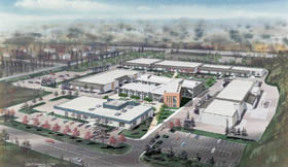If you visit the campus of Bates Technical College, theres a phrase you may hear from the schools faculty: Best-kept secret.
That is how Sharon Barber and John Rodenberg, who run the schools Tacoma Business Center, described the college last fall, when the Index profiled their program.
And that is how Bates President David Borofsky described the college during Tuesdays City Council Study Session. Borofsky was promoting the colleges South Campus Expansion Project — a plan that calls for construction of a new building in the center of campus, and an expansion at the campuss north end. Its a plan that hinges on the city selling a parcel of adjacent land. The president presented the expansion plans and encouraged the council to draw a resolution to permit the city to sell the land to the technical college.
Bates is the citys best-kept secret, Borofsky explained. The economic benefit of Bates Technical College on the community is impressive.
According to Borofsky, the college employed 977 people in 2004, pays $21 million in direct wages, salaries, and benefits annually, and accounts for $128.8 million of all annual earnings in the Pierce County economy.
Bates is the largest technical college in the Washington State Community and Technical College System. It operates three major campuses (Downtown, South, and Mohler), and offers 65 different full-time professional technical career-training programs. 5,469 full-time students enrolled at Bates during the 2003-04 term. And the college also operates KBTC television, a public broadcasting station with coverage from Everett to Centralia.
The college wants to expand into the biotechnology industry and become the first two-year training program in Washington state to incorporate biomanufacturing into its curriculum. In 1997, Borofsky explained, the college developed a capital expansion plan for South Campus to address that goal and make plans for growth in enrollment. That plan called for acquisition of the adjacent city-owned property and construction of a 40,000 square foot building. The new building would house the biotechnology program in a state of the art classroom and laboratory, Home & Family Life programs, academic classrooms, flexible meeting spaces, distance learning classrooms, computer labs, a library, and student commons.
In 2001, Bates received funding approval for the pre-design of the project. Two years later, the college received funds for the design and purchase of the property.
The design includes a new multi-level courtyard with landscaping and seating areas, parking at the perimeter of the site to replace parking removed for the new building in the center of campus, and re-location of the Truck Driving Circuit to the north side of the campus, on the property Bates wants to purchase from the city.
If the city decides to sell the land to Bates, construction on the project would begin this summer, and the new facility would open January 2007. It would be the first new building added to the college since it opened in 1940.
City Council support for selling the property to Bates was mixed at the study session. Most councilmembers applauded Bates for its role in the community, while also recognizing the propertys potential as a source of tax revenue (it is situated next to Interstate 5, less than two miles from the Tacoma Mall).
Education is a priority in this community, said City Council member Kevin Phelps. We could put an Albertson’s there, but education is something our taxpayers value and want us to put a higher priority on.
Mayor Bill Baarsma showed support for the project, but also had concerns about use of the land. Its a different concept than we originally thought, he said. Early design plans placed the administration building on the vacant property, instead of in the center of campus, which now serves as the schools parking lot. Placing the building in the center of campus moves the parking lot to the adjacent, city-owned property.
Deputy Mayor Connie Ladenburg added, The land will be used for more than a parking lot, right?
Borofsky assured the mayor and city council that the site would be more than a parking lot. It would also house the schools Truck Driver program, which graduates 60-100 people per year. Bates is the only publicly funded college in the U.S. with multiple Professional Truck Driving Institute certifications, according to Borofsky.
The city and Bates have yet to formally discuss a price for the property. The mayor indicated the issue would be discussed during Executive Session.
Borofsky indicated that the state of Washington has appropriated $700,000 for purchase of the property, and the college would secure additional funding if needed, should the city decide to sell the property for more than that amount.
In a similar scenario, the colleges Mohler site was purchased from Viacom for $5.3 million dollar. That price included the building and equipment, and was a tax-deductible move for Viacom.
South Campus development is one part of a 10-year Facilities Master Plan developed in 2003. That plan addresses facilities requirements at all three campuses, with specific improvements in the following areas (other than South Campus):
Downtown Campus — vacation of South 12th St.; expansion of the courtyard to the center of the East building; and enhancement of entries to the buildings and pedestrian connections.
Mohler Campus — construction of a new 69,440 square foot facility to provide space for the Communications Technology program, Business and Management Training Center, library, academic classrooms, computer labs, and conference areas; improvements to telecommunications capabilities; and creation of a center for high-tech business training.
The Facilities Master Plan aims to meet several key enrollment projections. According to Bates, the enrollment at two-year colleges will increase by 31,000 students in the next decade. Borofsky expects enrollment at Bates to grow 33% (approximately 5,000 new enrollments) over the next decade.
Bates also sees the states economy shifting from manufacturing and aerospace industries to information technology, health care, and professional and technical services.
Bates must position itself to meet new and emerging technologies and industries, said Borofsky.








